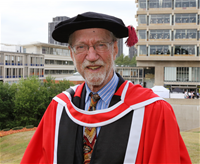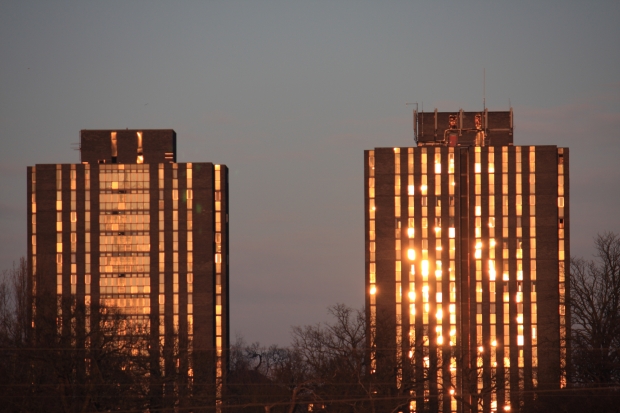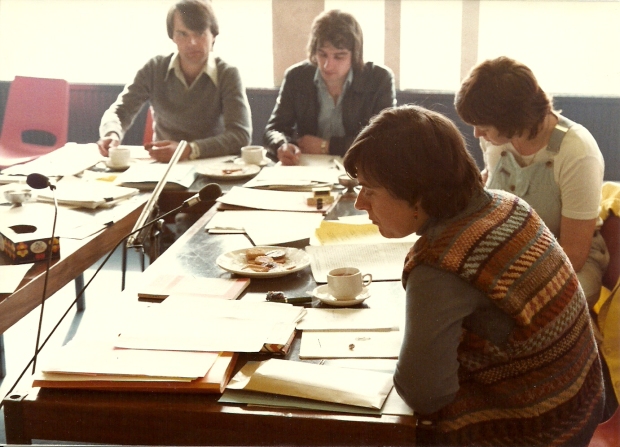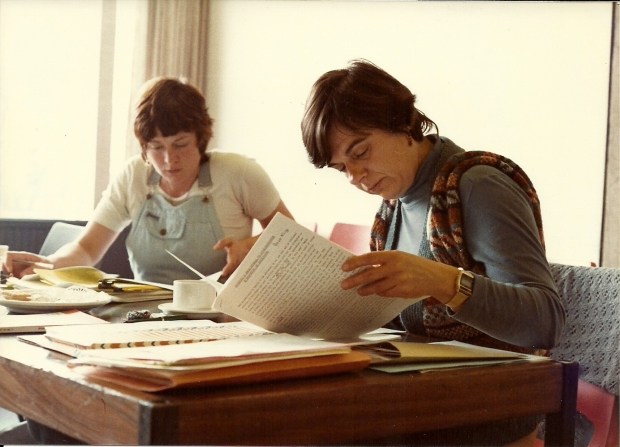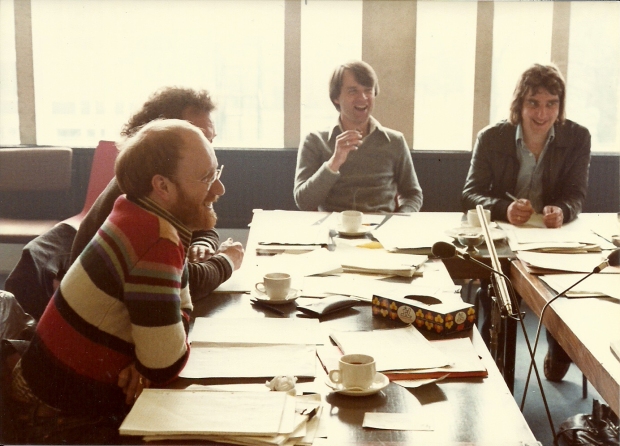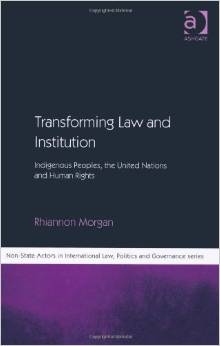Posts Tagged graduates
New Honorary Degrees
Posted by stories of essex sociology in Alumni, Around the world, Former staff, Uncategorized on August 19, 2015
Two former Essex people were awarded Honorary Degrees at this year’s Graduation Ceremonies
Paul Thompson is a world pioneering oral historian and was a founder appointment in the sociology department in September 1964. He has been associated with the department for the past fifty years!
Andrew Mack was an early Sociology/ Government student at Essex. He helped revolutionise the field of peace research, making important contributions to the work of the United Nations and working at leading universities around the world.
He is currently Director of the Human Security Report Project at Simon Fraser University in Canada and a faculty member of the university’s new School for International Studies. Prior to this he directed the Human Security Centre at the University of British Columbia. Before this, Professor Mack was a Visiting Professor at the Program on Humanitarian Policy and Conflict Research at Harvard University.
Professor Andrew Mack is an Essex alumnus who helped revolutionise the field of peace research, making important contributions to the work of the United Nations and working at leading universities around the world.School for International Studies. Prior to this he directed the Human Security Centre at the University of British Columbia. Before this, Professor Mack was a Visiting Professor at the Program on Humanitarian Policy and Conflict Research at Harvard University.
Hear what they have to say on the University/ Department Facebook Page
Click here:
https://www.facebook.com/UoESociology
Sociology Department’s 50th Anniversary Conference: 24th June, 2015 PROGRAMME
Posted by stories of essex sociology in Alumni, Former staff, History on June 15, 2015
Sociology Department’s 50th Anniversary Conference:
24th June, 2015 Programme
NEW DIALOGUES AND DIRECTIONS
Ivor Crewe Auditorium
9.15-9.50 Registration and Refreshments
9.50-10.00 Conference Introduction (Nigel South)
10.00-12.30 Past Excitements New Dialogues
A panel of distinguished members of the Department reflect on what was thought to be most exciting about Sociology in the past (both as a discipline and in the way[s] in which it was practiced at Essex) – and how all this has been reflected in their own ideas and research – as well as in ‘new dialogues and directions’ today (Ted Benton; Joan Busfield; Diane Elson; Ken Plummer; John Scott; and Paul Thompson)
10.00-11.15:
Chair: Lydia Morris
-Paul Thomson ‘Discovering life stories from first fumbles to our own Pioneers of Social Research’ (30 min)
-Joan Busfield ‘Continuities and Changes in British Sociology’. (15 min)
-Ted Benton ‘Beyond nature/society dualisms (15 min)
Questions (15 min)
11.15-11.30 Break
11.30-12.30:
Chair: Michael Roper
-Ken Plummer ‘Dialogues of Hope for a Better World’ (15 min)
-John Scott ‘Stratification and Social Theory: Retrospect and Prospect’ (15 min)
-Diane Elson ‘Challenges to Women’s Rights in a Time of ‘Austerity”? (15 min)
Questions (15 min)
12.30-14.00 Lunch break
14.00-16.000 Future Challenges New Directions
In three parallel, thematic sessions, colleagues who have joined the Department in more recent years will reflect on the interesting/challenging issues facing Sociology in the 21st century
Room 5S.3.8 Challenging Questions in Social Theory
Chair: Sean Nixon
-Michael Halewood, “Rethinking the Social” (20 min)
-Linsey McGoey, “Theorizing Excess” (20 min)
-Sandya Hewamanne, “Affect, Human Genome, and Dogs and Monkeys” (20 min)
PhD Discussant: Ms Stephanie Nitsche 5 mins
15 minutes question time
Following the session please re-convene at the Ivor Crewe Auditorium
Room 5S.4.9 Civic Challenges, Community Studies and Public Sociology
Chair: Jackie Turton
-Michael Bailey, “Whither Community Studies? Return to Ecclesfield” (20 min)
-Neli Demireva and Isabel Crowhurst, “The Impact of Sociological Research on Social Policy” (20 min)
-Robin West, “Environment: Moral Selves and Civic Responsibilities” (20 min)
PhD Discussant: Ms Sarah Day 5 mins
15 minutes question time
Following the session please re-convene at the Ivor Crewe Auditorium
Room 5N.4.6 New Terrains
Chair: Andrew Canessa
-James Allen-Robertson, ‘Gameplay Capitalism and the Hacker Ethic’. (20 min)
-Darren Thiel, “Countering Austerity and the Logic of Welfare Reform” (20 min)
-Pete Fussey, “Topologies of Urban Security and Surveillance in the Post-Snowden Era” (20 min)
PhD Discussant: Ms Roxana Baltaru 5 mins
15 minutes question time
Following the session please re-convene at the Ivor Crewe Auditorium
16.00-17.00 Ivor Crewe Auditorium
Closing Comments (Sean Nixon)
and Drinks.
The 50th Anniversary Conference of the Department of Sociology
Posted by stories of essex sociology in Alumni, Former staff on May 10, 2015
The 50th Anniversary Conference of the Department of Sociology
Wednesday 24th June, 2015
Ivor Crewe Hall, 9.30 start.
The Essex Sociology Department has helped to shape sociological thought and practice across Britain and around the world. In our 50th year, a panel of distinguished former and current members offer their own critical reflection on this contribution.
In the morning, we discuss its legacies and the new dialogues it continues to foster (Ted Benton, Joan Busfield, Diane Elson, Ken Plummer, John Scott and Paul Thompson).
In the afternoon, there will be three thematic sessions (social theory, civic challenges and new terrains) that will explore some of the Department’s contemporary research challenges and collaborations. These include: theorizing excess, moral selfhood, hacker ethics, countering austerity and urban security (Michael Halewood, Linsey McGoey, Sandya Hewamanne, Michael Bailey, Neli Demireva, Isabel Crowhurst, Robin West, James Allen- Robertson, Darren Thiel, Pete Fussey).
ALL WELCOME
For further details and to reserve your place please contact Agnes Skamballis on askamb@essex.ac.uk
Jennifer Bullen MA 2006, Ph D 2010
Posted by stories of essex sociology in Alumni, Obituaries on April 3, 2015
Eamonn Carrabine writes:
I would like to say a few words as Jen’s death touched many of us…she was a familiar figure around the department, having begun to study here in 2005 taking the MA in Sociological Research and then going on to complete her PhD in 2010…She also worked as a GTA in the department, and was much liked by her fellow teachers and students. In addition to this, she also worked closely with Jackie Turton as a researcher interviewing inmates at Bullwood Hall prison about their life stories. These interviews were filmed and then edited to be used in training for prison staff. She also worked with Dick Hobbs as a researcher on one of his projects looking at the Champions League. This breadth of experience is unusual for a PhD student, but I think gives a sense of how much faith we had in her abilities. I have many memories of Jen, but I want to share two.
The first is when I first met her. This was just after she had been awarded the ESRC funding to come and study here. The project was meant to be on I think, a social history of female football fans, but it was clear she was not really interested in that topic and instead she wanted to change focus and concentrate on the then new phenomenon of WAGs. Footballers Wives and Girlfriends. So from the beginning I knew she was someone who had a very strong view about what they wanted to do in their research, and who was determined to achieve all that she set out to do. And for me that quickly became one of her defining features, a very determined mind set mixed with a quiet enthusiasm for whatever task was at hand.
The second memory is when I was at home one early evening, several years later, and Radio 5 was on in the background as I was making the dinner. I heard one of the presenters saying they were now going to go live to the British Sociological Association conference, where they were going to interview someone who was researching WAGs. The interviewer was Pete Allen, and for those of you who know the station, know he can be difficult, and I knew he was going to be highly sceptical of academics doing research on this kind of thing. But, I have to say I was absolutely blown away by how well Jen handled the interview, giving measured, thoughtful and calm answers to what were pretty hostile questions. It was a very impressive and assured performance, giving listeners some much needed sociological insight into how the media themselves represent WAGs.
It was one of those moments when I felt that Jen was the kind of student that the Department should feel very proud to have given an intellectual home to for over five years…and I think for much of that time she was very happy here, making some very close friends along the way and I think this tree will be one way in which her memory will live on in Essex.
Eamonn Carrabine
The Queer/ Gay/ Sexualities Research Tradition at Essex
Posted by stories of essex sociology in Books, Former staff on April 3, 2015
One of the many fields of research in the Essex Sociology Department has been ‘sexualities’. In the 1990’s it established the journal Sexualities and in the 00’s it set up the Centre for Intimate and Sexual Citizenship run by Róisín Ryan Flood. To celebrate the 50th anniversary, a seminar was held in March 2015 to look at some of its earliest work that helped to create a new field of study – lesbian and gay studies, queer studies and critical sexualities studies – and to consider just how far it has advanced.
In the 1970’s there was almost no research in these areas and Essex was one of the pioneers. Mary McIntosh’s The Homosexual Role – which argued that homosexuality was not a universal condition but a variable social role- is often seen as a foundational text. The seminar was held in her memory, discussed her work and highlighted the earliest collective work produced in the department during the 1970’s and published in 1981 as The Making of the Modern Homosexual. This book brought together students and staff, and suggested new directions for research. Most notably it developed a historical sense of same-sex relations; linked it firmly to power, gender and identity; and developed the debate over constructionism and essentialism. While they were innovative then, many now would take these early paradigm shifts for granted as a new vibrant field of ‘sexualities studies’ has emerged over the past twenty years, moved on and developed new concerns.
The book The Making of the Modern Homosexual was organized into three parts. The first part reprinted the McIntosh article and Mary then discussed its value in an interview with Jeffrey Weeks and Ken Plummer. It suggested key features of new emerging frameworks. The second part took up three key themes: Ken Plummer suggested the fruitfulness of applying stigma theory, labeling theory and ideas of ‘oppression’ to homosexuality; Jeffrey Weeks puzzled the historiography of homosexuality and its latent essentialism; while Annabel Faraday critiqued the apparent males bias of existing ‘male’ ‘gay’ research and suggested new radical feminist baselines. The third part then provided three empirical studies being conducted by graduate students – a first (John Marshall) traced the emergence of the category from the late 19th century to the 50’s; a second (Dave King) looked at the making of ‘trans’ categories; and a third (Gregg Blachford) looked at the growing significance of ‘masculinity’ in the gay culture. Some of these contributors will be returning for the seminar and meeting again for the first time in over thirty years!
The session was very lively. Gregg Blachford had flown in from Canada to chair the session and John Marshall – who left to become editor of Gay News and gay Times for much of the 1980’a – returned to Essex for the first time in over thirty years. Annabel Faraday sent a message saying she had left academia for the world of ceramics and wished the seminar well. Dave King has now retired to a Welsh village where he participates in the local community shop.
The world has moved on. When Essex was established ‘homosexuality’ was still a crime and firmly defined as sickness. The Gay, Lesbian and Women’s movement had not happened and AIDS had not arrived. Over the years there have been major changes and now the university has strong policies on supporting gay, gender and transgender equality rights. The seminar ended by asking just how much has things really changed? Not as much as it looks on the surface – especially if the global stage is considered.
Here are a few photos taken at a seminar in 1980 as the authors discussed their papers.
Rhiannon Morgan (1974-2014) M.A, Ph.D.
Posted by stories of essex sociology in Alumni, Books, Obituaries, Roll Call on March 26, 2015
It is with great sadness that we heard of the death of Rhiannon Morgan, aged 40, on 26th October 2014. Rhiannon came to Essex in 1999 to study the MA in Human Rights and then moved to Sociology to pursue her PhD on the global indigenous movement, which she completed in 2004. During her time in the department Rhiannon was not only a dedicated and outstanding scholar. She was also a very active, sociable member of the PhD community, and an enthusiast for the staff-student football matches that thrived at this time. On completing her PhD, Rhiannon went on to a post-doctoral fellowship at Cambridge, and then took up post at Oxford Brookes University in 2007 where she became Senior Lecturer in Political Sociology. In addition to her work on indigenous peoples, Rhiannon was interested in the rights of refugees and carried out research with Iraqi refugees living in Jordan. Her publications included: Human Rights: Social Science Perspectives which she co-edited with Bryan Turner (Routledge, 2008); and her monograph, Transforming Law and Institution: Indigenous Peoples, the United Nations and Human Rights (Ashgate 2011). Rhiannon was supported and loved by a close family through her illness, which she faced with dignity, bravery, humour and concern for the pain of others. She leaves a husband, parents, siblings and two daughters, aged 4 years and 5 years.
Jane Hindley
The 100th Blog entry: Annemarie Naylor M.B.E and ‘Common Futures’
Posted by stories of essex sociology in Alumni on January 10, 2015
Annemarie Naylor was a sociology student at Essex in the mid late 1990’s, gaining a distinction for her sociology degree. She went on for a while to study for a PhD, and became the manager and designer of the sociology department’s first web site. After leaving Essex, she went on to community activism.
She writes about her work:
I am a Director of Common Futures, a modest new venture working with the public, private and third sectors to explore and kick at the boundaries of the community ownership landscape.
The ownership and management of land and buildings by communities for public benefit is nowadays a feature of neighbourhoods the length and breadth of the UK.
There is no shortage of ambition – with communities engaged and hard at work in socially conscious attempts to take control of an altogether bewildering range of assets. Likewise, the social enterprise sector and interest in social and impact investment is growing apace. However, technological advancements are transforming the operating context at break-neck speed. Increasingly, people expect super-fast broadband and 24/7 access to public services.
Government is investing to upgrade our digital infrastructure. It is implementing a digital-by-default approach to public service transformation. And, it is investing significant public funds in open and big data alongside cutting-edge technological innovation. But, there are potentially very serious ramifications for deprived communities – whether we’re talking about accessibility, affordability or confidence, knowledge and skills. Equally, there are concerns about the preparedness of the third sector and communities, more broadly, for the revolution that is already well underway. Nonetheless, there are also significant opportunities and considerable scope for socially conscious types to identify with the principles of openness and mutuality that underpin so much that is good about our ‘brave new world’. In fact, we can all get involved in developing our digital communities.
A handful of communities have made a start already – becoming ‘civic engineers’ and establishing themselves as community broadband pioneers. Elsewhere, the creative industries are flourishing, and a local manufacturing revolution borne of the hacker and maker movements is increasingly discernible, with social enterprises beginning to come to the fore. Still others have spotted the potential to begin developing digital services and internet enterprises to deliver social impact and improve their income generation prospects.
We’re here to advise the public sector as well as to help communities with all of that. If you’d like to know more, please take a look at our website and get in touch.
See:http://www.ourdigitalcommunity.org/users/annemarie-naylor
In January 2014, it was announced in the Queen’s Honour List that she had been awarded an MBE for her work.
Congratulations Annemarie!
Good reviews for IMAGINATIONS: FIFTY YEARS OF ESSEX SOCIOLOGY
Posted by stories of essex sociology in Alumni, Books, Former staff, History on September 27, 2014
Here are some of the unsolicited REVIEWS since the publication of IMAGINATIONS:
Thank you for giving us this precious gift. Leonore Davidoff … Absolutely blown away by the book! A really wonderful achievement. The photographs are especially wonderful! Sean Nixon… It is a fitting celebration of a departmental jewel in the Essex crown. Anthony Forster…What a splendid achievement! I have only so far had the opportunity to read here and there, but enough to know how rewarding it is going to be to work through it. Alasdair MacIntyre… It looks great and will be a lasting memory of the department. Sue Aylott …Will be a landmark book in the history of the University. David Lane … It is truly a major compilation. Peter Abell… It is BRILLIANT. It is so well produced and the pics are wonderful. Miriam Glucksmann… I think the book is splendid! It’s Wonderfully designed and full of fascinating reflections on a department I am proud to have been a member of. David Rose… Congratulations once again for the book. It is a reflection of your passion for sociology and sociology at Essex but also a contribution to wider sociological discussions! Carlos Gigoux… Congratulations on producing an excellent volume that brings back very many and all sorts of memories as well as posing many questions – especially where are they now? Adrian Sinfield…The book is splendid. Anthony Woodiwiss … Even though I had high expectations of the book, it really is a triumph, a fantastic thing… and I have barely dipped into it. It really is a thing of beauty. Rowena Macaulay…The book looks great. It is a pretty comprehensive view of ‘the department’, and is really impressive because it’s so unique. Colin Samson … I’ve been thinking about the Essex Sociology 50 Years book, and marveling that you’ve managed to put it together. I’m so pleased it exists, and I’m sure there are so many other people who feel exactly the same. Rob Stones
Copies are best ordered through
The Wivenhoe Bookshop by phone 01026 824050; by e mail wiven.books@zelnet.co.uk; or web site: www.wivenhoebooks.com
Directly from Ken Plummer through plumk@essex.ac.uk
Or Waterstones, the Essex University Bookshop by phone: 01206 864773 or email: essexuni@waterstones. com
Publication price: £25.00
With post and packing in UK £30.00 Overseas will have to add extra.
ISBN: 9780957085046; 208pp, 50 contributors.
It can also be ordered though Amazon but they will, as we know, effectively take all the money!
And here is A CONTENTS GUIDE to the book
CONTENTS: Introduction: Ken Plummer 1. Contexts – Creating Essex Sociology-A Timeline of Memorable Moments Peter Townsend’s Founding Vision – Transforming Visions for a Twenty First Century. 2. Formations The Early History: Joan Busfield: Remembering Early Days – Adrian Sinfield: The Challenge of Social Policy – Geoffrey Hawthorn; A New Lecturer’s View – Christel Lane: A Student’s View: Undergraduate Study During The University’s Early Years: 1968–1972 – David Bouchier: From Student to Staff: David Bouchier (1968–1986)- Making Troubles – David Lane:1968 – Michael Mann: Troubles of 1974- Judith Okely: The 1989 Czech ‘Velvet Revolution’ As Experienced At Essex 3. Wisdoms Imagining Social Justice: Creating Better Social Worlds For All Introduction.- Michael Harloe: On Peter Townsend’s Poverty – Stan Cohen: Remembering Harold Wolpe – Lydia Morris: Human Rights – Michael Bailey: Public Activism Research Imaginations: Creating Multiple Methods For Sociology Introduction: Unlimited Research – Peter Abell: Whatever Happened to Mathematical Sociology? – David Rose: The Origins of The Institute for Economic and Social Research ISER – Heather Laurie: ISER: So What Happened Next?- Louise Corti: The Creation of Qualidata Mark Harvey: Centre for Economic and Social Innovation Comparative Imaginations: Building An International Sociology Introduction. Alison Scott: On the School of Comparative Studies -Ayse Güveli: The Gains and Changes of Migration- Interdisciplinary Imaginations: Broadening The Scope of Sociology Alasdair MacIntyre: Philosophy in the Sociological Conversation 1960−1970 – Michael Roper: Social and Gender History Ken Plummer: Making the Person Matter – Karl Figlio: The Creation of the Centre for Pychoanalytic Studies – Eamonn Carrabine: Imagining Crime – Sean Nixon: The Moment of Cultural Studies – Michael Halewood: Theory in the Department – Colin Samson: Sociology, Neoliberalism and the Struggle to Keep the Interdisciplinary Spirit Alive 4. Communities Remembering Communities John Scott: Coming Home – Rob Stones: The 1990s in the Essex Sociology Department: A Personal Point of View- Mary McIntosh says goodbye Miriam Glucksmann: Remembering the 1990s – Building The Educational Community: The Great Sociological Conversation Rowena Macaulay: Twenty Years of Departmental Support: The Student Resource Centre – The Office Community Mary Girling & Paul Thompson: Reflections of a Departmental Secretary – The Global Community From South Africa: From Hong Kong: From India – The Web Site Community The Long Community Nigel South 5. Futures Looking Ahead Voices: Professors Voices: Former students- Refelctions: Telling stories of Essex Sociology- Epilogue And Reprise: The Last Refuge – Suggestions for Further Reading – Index Focus Boxes: The heads of department -The Vice-Chancellors -The expansion and transformations of Essex- Profile of an early student – The professors – Social class and David Lockwood – Seeking gender justice – feminism in sociology – A red-green revolution? – Moments of oral history at Essex: From Gay Liberation to “Sexualities” and Intimate Citizenship- Focus on Essex’s Legacy: Some Fifty or so research areas and their books – Evaluating the quality of research – Some of the most cited books in the department – Focus On Public Lecture Series: The Fuller Lectures – Focus on Dennis Marsden – Honorary degrees – Consolidating the canon: The textbook tradition at Essex – Student numbers at Essex – Focus on the Rise of Teaching Assistants – Focus on the Essex newsletters and journals: The reading and writing community – Managing the department: The Secretaries – Paul Thompson remembers Brenda Corti- More stories of Essex Sociology- Focus on Essex’s Legacy: Some Fifty or so books published by graduates and researchers – Focus on Essex’s Legacy: Some Fifty or so graduates and researchers who became ‘Essex’ Professors – Sociology in the Media: Pam Cox- Handing our stories on.
Claudia Robles (2004-2010, PhD)
Posted by stories of essex sociology in Alumni, Around the world on August 28, 2014
 I first came to Essex in 2004 to pursue a MA in Sociology of Development and ended completing my PhD in Sociology in 2010. I chose to pursue my postgraduate studies at Essex’s Department of Sociology due to its past and present, its commitment to social change and equal opportunities for all and the excellence of its work.
I first came to Essex in 2004 to pursue a MA in Sociology of Development and ended completing my PhD in Sociology in 2010. I chose to pursue my postgraduate studies at Essex’s Department of Sociology due to its past and present, its commitment to social change and equal opportunities for all and the excellence of its work.
Life in Essex, and Colchester in particular, confronted me in many ways with preconceived ideas of development and was often a challenging experience. Intercultural exchange was a significant gain of this period, as well as affections that will endure for life. In professional terms, Essex marked me deeply. Writing and research skills, ethnography, econometrics, political economy, development, were all tools I gained and that prepared me to perform in diverse platforms, including the academia, international organizations and politics.
In 2009, I joined the Economic Commission for Latin America and the Caribbean and since 2012, I have worked as a social policy specialist for UNICEF El Salvador. Writing background documents for policy-making might seem distant from traditional sociological practice. However, I see sociology as immanent in these tasks imprinting a perspective to approach social reality, an eager interest for seeking explanations, not conforming to facts in the surface.
I think of the future of sociology from a land where this is uncertain. After enduring 12 years of civil war in the recent past, today it has become a post-conflict society and a low middle-income country. Yet, 5800 children and adolescents were killed by gang activity in El Salvador between 2008 and 2012. 50% of children and adolescents live in monetary poverty. Most of them will only occasionally relate to the state, mostly through public education that they will likely abandon at the age of 14 or by receiving a cash transfer that will partly alleviate their more acute needs. In such a context, citizenship and any form of social cohesion finds several obstacle to develop, becoming a matter of policy attention.
For periods, sociology was banned in the country. Today, while researchers are scarce, society has few observers and remains rather blind to understand how social ties have deteriorated to such a point. The national and international academia says little in probably one of the most interesting countries to do sociology in the world.
Yet, I never imagined the importance of sociological thinking until I came to this country. With few tools to examine society, there are few hints to start improving things from the deep. Such a change goes beyond institutional or policy transformations; it requires citizenry wanting to live or act together, convinced that this is still worthy. Digging into people’s motivations, drives, collective frustrations, fears and dreams might provide a starting point to build a new future.
Do I think there is a future for sociology in 50 years? I certainly do, as long as we decide that social forms of organization are still necessary. Bear in mind that this is not granted. Do I think it is relevant? More than ever, as I have witnessed its capacity to lead change in people’s everyday lives. What do I expect from sociological practice in the future? I envisage an academia interacting with other actors beyond its physical and symbolic walls; I see sociologists submerged in different arenas, hunger for understanding, conducting organized practices to uncover factors explaining social facts, empowered by their research’s impacts, humble before the immensity of the never ending task.
This is an entry from the book: Imaginations- 50 Years of Essex Sociology.
50th Anniversary: Homecoming Weekend
Posted by stories of essex sociology in Alumni, Former staff on August 10, 2014
Essex 50th ‘HOMECOMING WEEKEND’
September 12th-14th
University of Essex
Homecoming is “a celebration event with a street festival vibe and we’ll be staging a huge range of activities and
events to showcase our strengths and keep you and your family entertained!”.
The weekend event launches a yearlong series of activities that celebrate the University of Essex.
Here are some of the things that may interest you if you visit on the Saturday:
Sociology Departmental Lunch, where the book Imaginations: 50 years of Essex* sociology will be officially launched. 12.30 -2.30 Tony Rich Centre
Bite-sized lectures from all departments, including from sociology:
11.30 Pam Cox on Shopgirls: Making at TV history
14.30 Paul Thompson on the early history of the university
15.30 Nigel South on ‘Consuming the planet’
All will be in LTB7. Re-live past memories!
Mustard – a film charting student activism in 1968
Architectural tours of campus/student rooms from the decades
Art Exchange open Exhibition
Exhibition in the Hex – Something Fierce**
plus: Sports activities; Things for children: Adventure trail (for 6 – 11 year olds) Brain science activities Comedy Club 4 Kids (6 years +) Entertainment; Music, late night
*Imaginations: fifty years of Essex Sociology is a major new book about the department. The Sociology Department at the University of Essex is a leading international sociology department. Through fifty contributions from past and present, the students and lecturers in the department tell the story of its history, its ideas and its community. It provides an unusual insight into the workings of a British university department as well as the shape of modern British sociology.
**Something Fierce is a major new exhibition which examines the history of the foundation of the University of Essex and 50 years of student life. The exhibition celebrates the bold, ‘brutalist’ sixties architecture of the Colchester Campus; the unique academic vision and the vibrant community of scholars and students they created. The Hexagon – one of the iconic buildings built at the birth of the University – hosts the displays and has been especially refurbished in time for our 50th anniversary. It includes
- Designs, artist’s impressions and scale models of the original plan
- films, audio and photos spanning the decades
- memories from staff and students
- a new virtual model of today’s Colchester Campus
- reconstructions of student rooms from the past
Booking is free and you can find more details of this on: https://www.essex.ac.uk/fifty/
